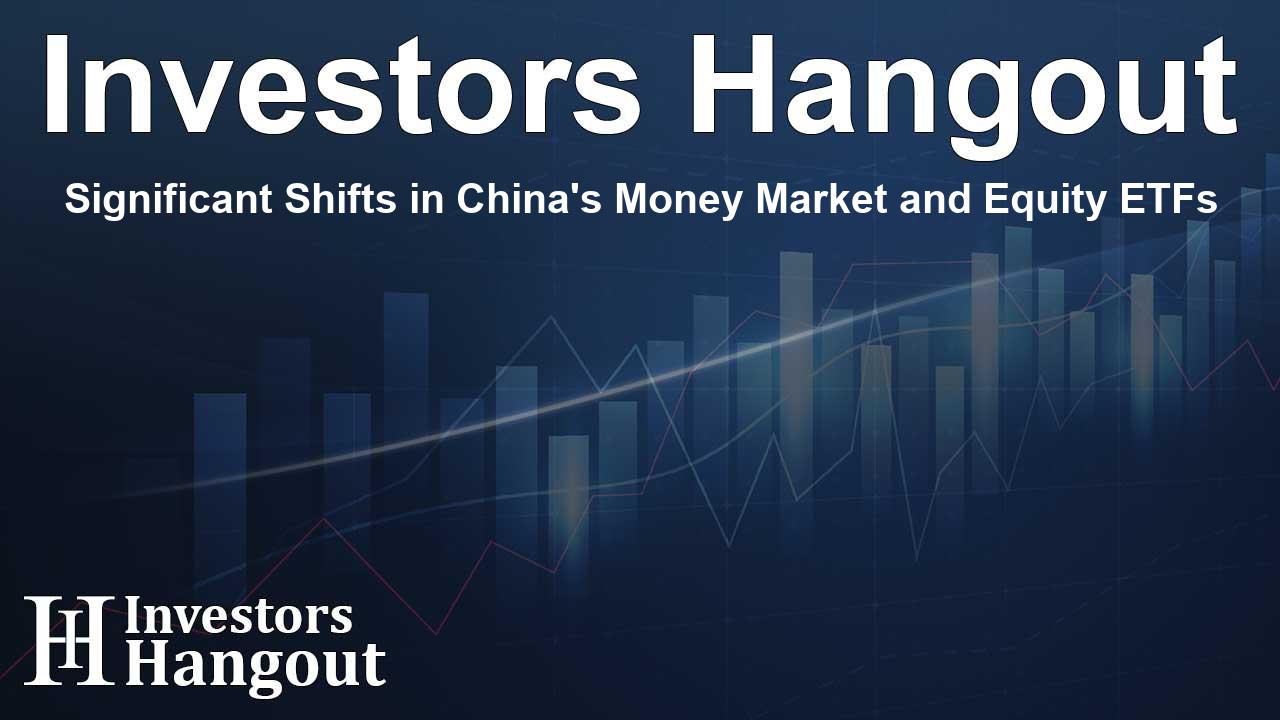Significant Shifts in China's Money Market and Equity ETFs

Understanding Recent Trends in China's Financial Markets
Recent developments in China's financial landscape have shown a remarkable shift in investor behavior. Billions of dollars have flowed out of the largest money market exchange-traded funds (ETFs) in the country. In contrast, these withdrawals were accompanied by significant investments in equity ETFs, suggesting a renewed interest in the Chinese stock market. This change indicates an evolving sentiment among investors, led by fresh confidence in what had been a struggling market.
Investor Movements: A Closer Look
Last week, China's top ten money market ETFs experienced a staggering $4.1 billion in outflows. Simultaneously, the ten leading equity ETFs drew in $6 billion. Investors responded to recent stimulus measures, creating a dynamic shift that marked the best performance for mainland stocks in over a decade.
Performance of Notable Funds
The outflows from money market funds were concentrated, with the Yinhua Traded Money Market Fund losing $2.4 billion and the Hwabao WP Cash Tianyi shedding $1.7 billion. These sums account for over 10% of their total investments. Conversely, the Huatai-Pinebridge CSI 300 ETF led equity fund inflows by attracting $2.9 billion.
Stimulus Measures Spark Changes
In an unexpected move, China's government implemented a wide range of stimulus efforts targeting economic recovery and financial market support. This included lowering borrowing costs, relaxing restrictions on second home purchases, and providing direct cash payments to citizens. Nick Ferres from Vantage Point Asset Management commented on the significant impact of these efforts, highlighting that while they may not be entirely sufficient, they represent a crucial turning point in market dynamics.
The Global Context of Money Market Funds
As global interest rates have risen to address inflation, money market funds in various countries have seen an influx of capital. In China, however, the situation is different, with deflation presenting unique challenges. This has driven investors towards money market products, especially in light of a prolonged downturn in the equity market. Such demand is pivotal in helping financial institutions manage seasonal liquidity challenges effectively, ensuring a balance in cash flow.
A Future Outlook for Investors
Investors are advised to adopt a proactive approach during these changing times. Britney Lam from Magellan Investments Holdings Ltd. encourages a mindset of "buy first, think later," referencing the recent rally in Chinese stocks. This advice mirrors historical trends where government interventions have previously spurred market growth. Lam emphasizes the importance of focusing on current market conditions rather than being overly cautious about prior economic data.
Sentiment Impact on Market Movements
As market cycles unfold, sentiment often plays a pivotal role in dictating movements in stock prices. Lam highlights that while economic fundamentals will eventually catch up, right now, market multiples and investor confidence are leading the charge. This phenomena of sentiment-driven market momentum showcases the intricate relationship between investor psychology and market performance.
Frequently Asked Questions
What is driving the recent outflows from Chinese money market ETFs?
The recent outflows are primarily driven by investors reallocating their capital towards equity ETFs, reflecting renewed confidence in the stock market following government stimulus measures.
What measures has China taken to rejuvenate its financial markets?
China has implemented various stimulus measures such as reducing borrowing costs, easing restrictions on housing purchases, and providing direct cash handouts to citizens.
How have the top equity ETFs performed amid this shift?
The top equity ETFs have seen substantial inflows, with the Huatai-Pinebridge CSI 300 ETF leading with an influx of $2.9 billion, indicating a strong investor interest.
What impact do interest rates have on money market funds globally?
Rising interest rates in developed markets generally attract more capital into money market funds as they offer a safer investment alternative; however, the situation in China is more nuanced due to prevailing deflation.
What advice are experts giving investors during this transition?
Experts suggest adopting a proactive investment strategy, emphasizing the importance of acting on current market trends rather than historical economic data, as market sentiment remains a powerful driver of performance.
About Investors Hangout
Investors Hangout is a leading online stock forum for financial discussion and learning, offering a wide range of free tools and resources. It draws in traders of all levels, who exchange market knowledge, investigate trading tactics, and keep an eye on industry developments in real time. Featuring financial articles, stock message boards, quotes, charts, company profiles, and live news updates. Through cooperative learning and a wealth of informational resources, it helps users from novices creating their first portfolios to experts honing their techniques. Join Investors Hangout today: https://investorshangout.com/
Disclaimer: The content of this article is solely for general informational purposes only; it does not represent legal, financial, or investment advice. Investors Hangout does not offer financial advice; the author is not a licensed financial advisor. Consult a qualified advisor before making any financial or investment decisions based on this article. The author's interpretation of publicly available data shapes the opinions presented here; as a result, they should not be taken as advice to purchase, sell, or hold any securities mentioned or any other investments. The author does not guarantee the accuracy, completeness, or timeliness of any material, providing it "as is." Information and market conditions may change; past performance is not indicative of future outcomes. If any of the material offered here is inaccurate, please contact us for corrections.